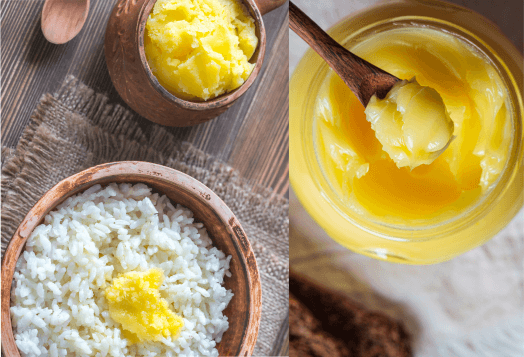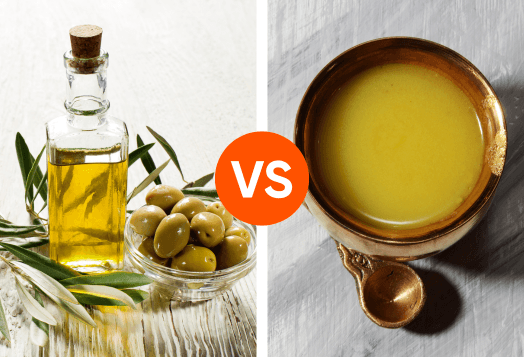
Every kitchen debates the choice of ghee vs refined oil, but the decision goes far beyond flavour. The fat you cook with can shape your heart health, weight, and cholesterol levels. While ghee carries centuries of tradition, refined oil claims modern convenience, so which one truly deserves a spot in your daily diet?
Curious about how ghee stacks up against other cooking oils for health?
Read our guide on Ghee vs Cooking Oil: Which Is the Healthier Choice?
A Closer Look at Ghee and Refined Oil
Ghee, also called clarified butter, is made by simmering butter until the water evaporates and the milk solids are removed. This gives it a nutty flavour and rich texture. Nutritionally, ghee provides saturated fats, Omega-3 fatty acids, and fat-soluble vitamins A, D, E, and K, which support immunity, bone strength, and vision. It also contains antioxidants that help fight inflammation.
Refined oils, such as sunflower, soybean, or canola oil, are produced by extracting oil from seeds and then undergoing processing like bleaching and deodorising. While they contain unsaturated fats that may support heart health, refining can strip away natural nutrients. Excessive consumption of refined oils may also contribute to inflammation and poor cholesterol balance.
What’s Really Inside Your Spoonful of Ghee or Oil?
Your spoonful of ghee or oil hides a complex mix of calories, fats, and nutrients that can shape your health in very different ways.
1. Calories and Fat Content
Both ghee and refined oil are calorie-dense, about 120 calories per tablespoon. The primary difference lies in the type of fat.
Ghee: Rich in saturated fats, which give it its unique taste and stability. In moderation, these fats can support hormone balance and energy.
Refined Oils: Higher in unsaturated fats (omega-6), which are generally suitable for heart health but can become harmful if consumed in excess compared to omega-3 intake.
Think of it this way, ghee is like a powerful spice, a little adds value, but too much overwhelms. Oils, when overused, become easy to pour and harder to track.
- Vitamins and Antioxidants
One reason people prefer ghee is its natural nutrients. It carries vitamins A, D, E, and K that help with vision, bone strength, skin health, and immunity. Refined oils, on the other hand, lose most of their nutrients in processing, and only a few are added back later.
Cooking Stability and Taste
Ghee has a high smoke point (around 250°C), meaning it remains stable even during deep frying, making it safer for Indian cooking methods like tadkas and curries. Most refined oils also have high smoke points, but because of their processing, they may oxidise faster and form harmful compounds if overheated. Flavour-wise, ghee enhances dishes with richness, while oils keep food lighter and neutral-tasting.
How Ghee and Oil Affect Heart Health
Your heart cares less about tradition and more about balance. Here’s how each fat plays a role:
1. Ghee and Cardiovascular Benefits
In moderation, ghee can raise HDL cholesterol (the “good cholesterol” that helps clear arteries) and provide omega-3 fatty acids, which reduce inflammation. For someone who eats home-cooked meals, adding a teaspoon of ghee to roti or dal can be heart-friendly when paired with a balanced diet rich in vegetables, fruits, and whole grains.
2. Refined Oil and Heart Risks
Refined oils are promoted as “heart-healthy” because of their unsaturated fats. However, excessive consumption, especially of fried foods, can lead to an imbalance of omega-6 to omega-3 fats. This imbalance triggers inflammation and can increase LDL (the “bad cholesterol”), raising heart risk. Street food or regular deep-fried snacks made in reheated oil are common culprits.
Ghee and Oil for Weight Management
Ever noticed how one spoon of ghee makes a simple meal feel filling? That’s because ghee supports digestion and promotes satiety; you feel full for longer, which can help prevent overeating. Ayurveda also links ghee with better metabolism and gut health. For weight watchers, using ghee mindfully (like brushing a thin layer on parathas) can keep cravings in check, unlike olive oil’s impact on weight loss.
Refined oils are light and easy to pour, which often leads to overuse. Since they add calories without the same satiety as ghee, you may end up eating more. For example, a sabzi cooked with extra oil may feel less satisfying than the same dish with a drizzle of ghee. Over time, this can contribute to weight gain.
Understanding Cholesterol with Ghee and Oil
Cholesterol often sounds scary, but here’s the simple version:
HDL cholesterol is like a cleaner, sweeping away excess fat.
LDL cholesterol is like a clogger, sticking to artery walls.
Ghee’s Impact on Cholesterol
Ghee, when eaten moderately, supports HDL cholesterol and provides short-chain fatty acids that may aid heart health. The key is balance; too much can tip the scale and raise overall cholesterol.
Refined Oil’s Impact on Cholesterol
Frequent consumption of refined oils, particularly in fried or packaged foods, can increase LDL cholesterol and triglycerides. This clogs arteries and increases long-term heart risks. Oils like olive or cold-pressed mustard are better alternatives if you want variety beyond ghee.
Practical Tips for Using Ghee and Oil Wisely
Portion Control: Keep ghee to 1–2 teaspoons a day if you’re watching your weight or cholesterol. For oil, try limiting it to 2–3 teaspoons daily.
Balance Fats: Combine ghee with other healthy fats guided by nutritionists and dietitians, such as olive oil, nuts, and seeds, to cover both flavour and health benefits.
Smart Cooking: Use ghee for tadka, spreading on rotis, or finishing dal. Use oil for stir-frying or when you want food to stay light.
Avoid Overheating Oils: Reheating refined oil repeatedly (like in street food) produces harmful compounds, something to avoid at home.
Finding the Right Balance
The debate of ghee vs refined oil isn’t about choosing one and rejecting the other completely; it’s about balance. Ghee brings tradition, flavour, and essential nutrients, while refined oils offer convenience and unsaturated fats. Used wisely, both can fit into a heart-friendly, weight-conscious lifestyle.
Disclaimer: This information provided is intended for general informational purposes only. It is not a substitute for professional advice or guidance. For personalised recommendations or specific concerns, please consult a certified professional.




